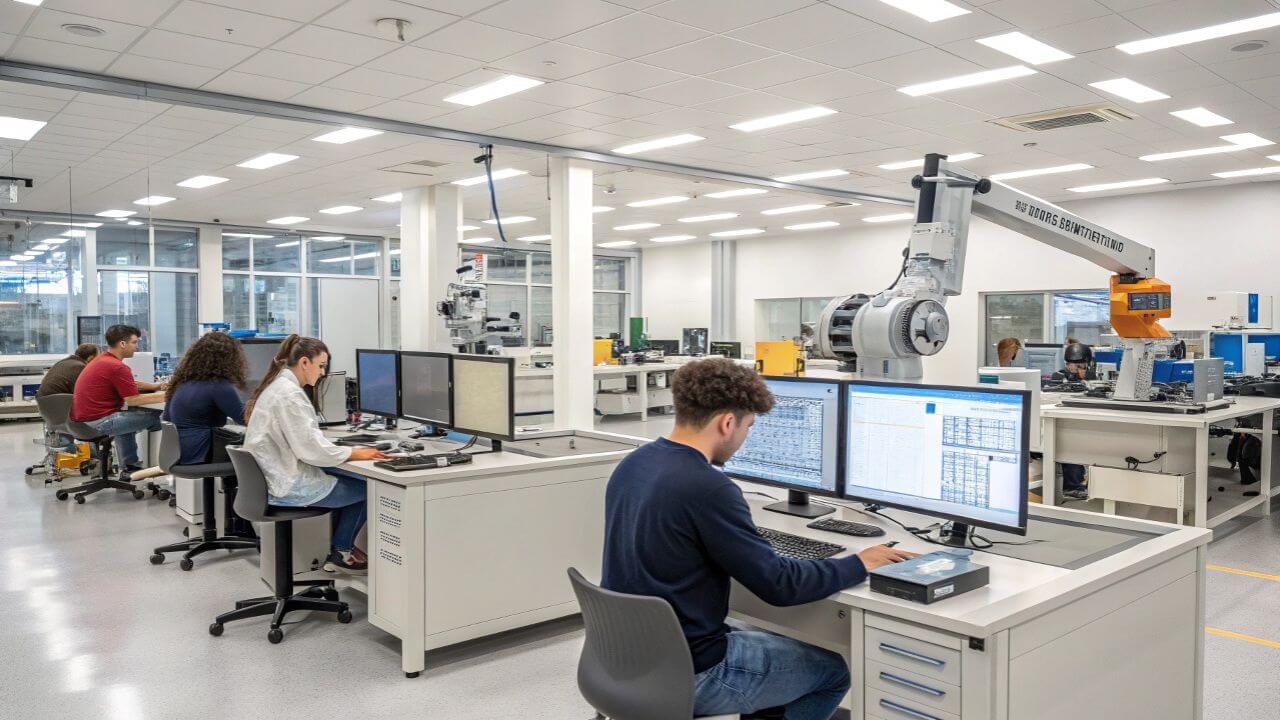Engineering technology is more than a classroom subject: it’s the bridge between ideas and real-world solutions. Unlike pure theory, it focuses on practical applications of engineering, turning concepts into designs, machines, and systems that shape everyday life. From robotics labs to construction sites, this field thrives on bridging theory and practice, giving students and professionals the chance to see their work come alive in industries that keep the world moving.
In today’s rapidly changing job market, an applied science degree in this field is opening doors to careers that didn’t exist a decade ago. With industry-ready skills and a passion for solving problems, graduates are stepping into roles that define the future of engineering technology jobs.
What is Engineering Technology?
Engineering technology is an applied science degree designed to teach students how to turn engineering ideas into products. Unlike traditional theory-heavy fields, this area focuses on practical applications of engineering. Students engage in hands-on learning and experiential education, working with automation systems, materials science, and manufacturing processes.
Graduates often describe it as walking a design-to-product pipeline, where you begin with a concept and finish with product implementation. The program’s career-focused curriculum ensures that every student learns both technical analysis and real-world problem solving. For U.S. learners asking why is it important to study technology and engineering, the answer is clear: these skills drive skilled workforce development and create future of engineering technology jobs that shape industries.
Engineering Technology vs Engineering: Key Differences
Many students wonder about what is engineering and technology compared to traditional engineering. The distinction is easy once you know it. Engineering focuses on advanced theory and scientific models, while an applied science degree emphasizes practical applications of engineering such as prototyping and testing. Although they play different roles, both are necessary.
An engineer might calculate equations behind a machine, while a mechatronics technologist or civil engineering technologist builds and maintains the system. That’s why this program highlights leadership in applied engineering, giving students the power to manage teams and projects. For someone exploring career opportunities in engineering technology, this path offers faster entry into industries that need people who can apply knowledge today, not ten years from now.
Specializations in Engineering Technology Programs
Specialization is where the degree gets exciting. You can pursue mechanical engineering technology, focusing on design and mechanics, or branch into electronic systems, dealing with circuits, controls, and devices. In aerospace, graduates explore aerospace technology careers, while others enter robotics and automation jobs in advanced industries.
Case studies show real success stories. For example, a mechanical engineer jetcool technologies worked on cooling systems that improve chip performance. Another graduate entered transportation, securing a position through industry partnerships with companies like Luminator. Internships such as luminator technology group software engineering intern salary opportunities provide insight into pay ranges for new professionals.
Curriculum and Hands-On Learning Experience
The curriculum blends science, design, and professional skills. You’ll study energy systems, CAD design software, project management in engineering, and safety and quality management. Unlike many fields, this program values experiential education, so students spend time in labs, working on machines and using advanced tools.
One highlight is the senior capstone, where students turn complex designs into functioning prototypes. This is prototyping and testing at its best, showing how classroom theory becomes reality. In short, the engineering technology degree is never just theory; it’s about preparing graduates for career opportunities in engineering technology through actual experience.
Engineering Technology Degree Options
In the U.S., you can start with an associate of applied science (AAS) or continue toward a bachelor of applied science (BAS). The AAS is typically two years and leads to entry-level roles like quality control technician or field service tech. The BAS opens higher roles such as system technologist or project manager.
Online opportunities are also expanding. Some schools provide a 2-year construction management degree online, which connects closely with engineering technology. Credits often transfer, making it easier for students to grow from AAS into BAS programs. This flexible ladder shows how the system encourages lifelong learning and adaptability.
Career Outlook and Salary Expectations
The U.S. market continues to show high demand for engineering technologists. While job growth in engineering technology is projected at 2.6% between 2025 and 2029, employers consistently report shortages of skilled graduates.
Here’s a quick look at salary levels in the U.S.:
| Level | Average Annual Salary | Example Role |
| Entry-Level | $55,000 | Quality control technician |
| Mid-Level | $72,000 | Mechatronics technologist |
| Senior-Level | $95,000+ | Project manager in engineering |
With opportunities in aerospace technology careers, automation, and advanced manufacturing, the potential for career growth is strong. This is why the engineering technology salary is attractive across different sectors.

Career Opportunities in Engineering Technology
Graduates find roles across industries. With an AAS, you might work as a drafter, maintenance technician, or quality control technician. A BAS opens doors to leadership roles such as robotics developer or system engineer.
Special cases, like the mechanical engineer jetcool technologies, highlight how this degree translates into innovative jobs. Likewise, robotics and automation jobs remain in high demand, as companies push toward smart factories and advanced design. Simply put, career opportunities in engineering technology are everywhere, from healthcare devices to renewable energy plants.
Networking and Industry Connections
One advantage of choosing this path is the chance to build strong industry connections. Universities partner with companies to create internships and job pipelines. These industry partnerships allow students to showcase skills before graduation, leading to full-time offers.
Networking also happens through professional societies and alumni groups. Joining these groups builds your profile, improves your knowledge, and gives you access to mentors. With the right contacts, your engineering technology degree can take you far.
Academic Support and Student Services
Strong programs don’t stop at classes. They provide academic services like advising, mentoring, and technical tutoring. Students get access to labs that support applied engineering solutions and encourage real-world problem solving.
Clubs and professional organizations also create safe spaces to learn and grow. By blending learning with support, schools make sure every graduate has the tools needed to succeed in U.S. engineering technology jobs.
Your Future with an Engineering Technology Degree
In the end, your path in engineering technology depends on your ambition. You can build careers in manufacturing, aerospace, construction, or electronics. With industry-ready skills and a focus on bridging theory and practice, graduates can handle challenges of tomorrow’s industries.
To explore programs and more details about this degree, you can check resources such as U.S. Bureau of Labor Statistics and Engineering.com. For more support and practical insights, feel free to explore our internal resources at GoTechanic.
FAQs:
What does Engineering Technology do?
This applied science degree uses engineering principles to design, improve, and maintain practical systems, products, and processes.
What do engineering technologists do?
Engineering technologists focus on real-world problem solving, working with design, testing, and implementation of technologies in industries like manufacturing, energy, and construction.
Is Engineering Technology difficult?
It can be challenging, but the career-focused curriculum and hands-on learning make it more practical and accessible than traditional engineering.
Is engineering tech a good career?
Yes, this degree provides excellent job prospects, solid salaries, and a wide range of career paths across industries.
Is there a demand for engineering technology?
Absolutely, with steady job growth in applied science fields across the U.S., driven by the rising need for a skilled, innovation-driven workforce.


